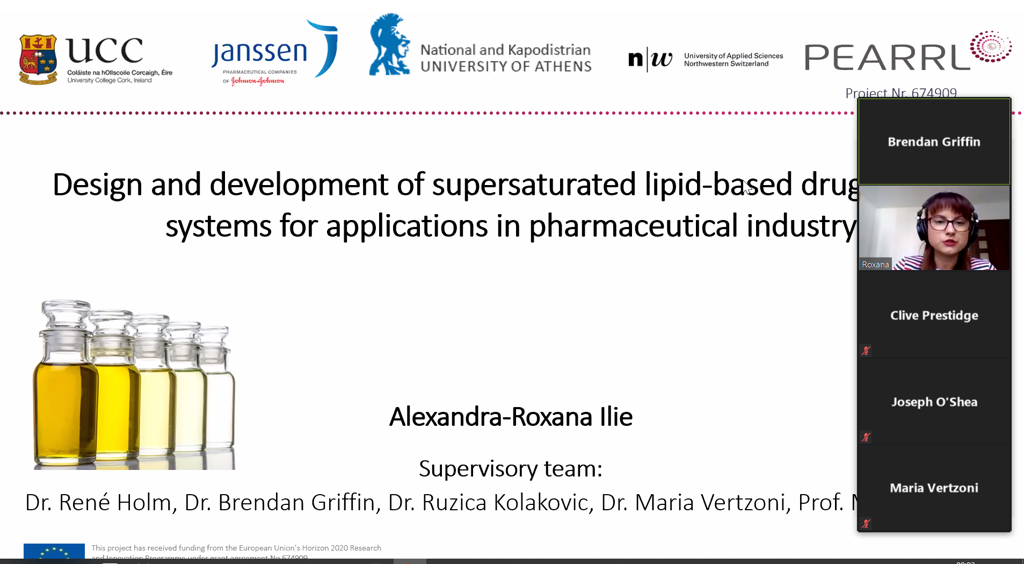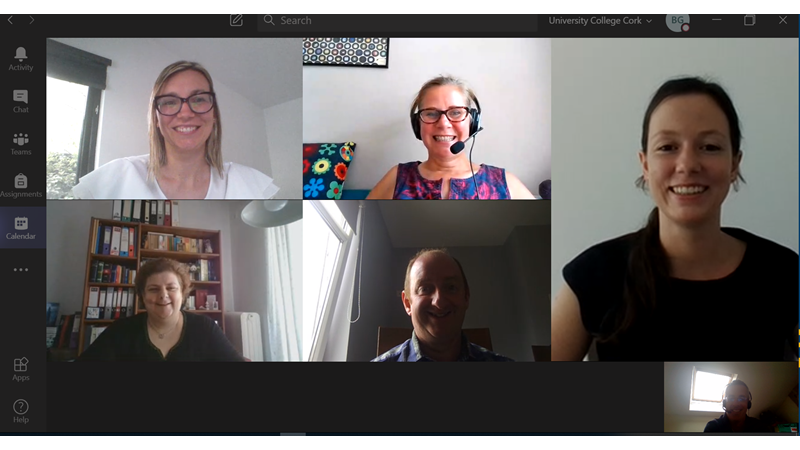| We would like to congratulate Roxana who has recently successfully defended her PhD. Within the PEARRL project, Roxana's individual project focused on establishing a biopharmaceutics tool to investigate the in vivo performance of supersaturated SNEDDS, useing the in vitro understanding to develop an in silico model to predict the in vivo performance and comparing the in vitro and in silico predictions to observations in vivo. In a short interview Roxana explains more about her project and the impact of PEARRL on her research and training. |
My research project was focused on the design and development of supersaturated lipid-based drug delivery systems (sLBDDS) for applications in pharmaceutical industry. Given that many novel drug candidates in pipelines are poorly water-soluble drugs, development of bio-enabling strategies such as sLBDDS are needed. Supersaturated lipid systems have the advantage of low-tech manufacturing methodology, ability to load high drug concentrations and improved drug absorption via excipient-mediated effects relative to conventional formulations. The work in my research project showed that sLBDDS can be designed for a range of poorly water-soluble drugs, that should have good lipid solubility and a high glass forming ability. Furthermore, it was concluded that simple one or two component lipid systems have the advantage of streamlining drug development processes and the better performance in comparison to more complex three component systems was shown. Furthermore, the use of two in vitro dispersion/digestion-permeation models has been successfully investigated with sLBDDS. Optimizations such as inclusion of precipitation inhibitors in sLBDDS improved drug absorption of cinnarizine, a drug which presented poor stability in lipid systems. To sum up, the work tackled three research pillars of design, development and optimization of supersaturated lipid-based drug delivery systems.
2. What impact does your research project and your outcomes have?
The different insights into design, development and optimization of supersaturated lipid-based drug delivery systems in a pharmaceutical industry setting sparked the interest of formulation scientists for such technology. The guidance maps and flow charts presented in my PhD thesis will be shared with the different groups in R&D and will serve as starting point for further development of these lipid systems. These will potentially determine inclusion of sLBDDS as formulation options in preclinical and clinical testing and will advance the development in the field.
3. What were your personal highlights over the course of your research project?
To me, the whole PERAAL experience was like a “dream come true” since I always wanted to do a PhD project in pharmaceutical industry. Even though in some aspects I missed the academic student life, the leanings I got from my colleagues in Janssen Pharmaceutica were of immense importance for my development. I feel that I was shaped as a rigorous scientist, who can handle different scientific or practical challenges, pays great attention to details and is always ready to “advertise” the research in order to set-up novel experimental designs. Several workshops and courses were also very relevant and covered very important topics such as development of scientific writing competencies, presentation and communication skills.
4. Are there any elements of the training you received that you find should be integrated in local doctoral programmes?
From PEARRL, I enjoyed the most the possibility to go on secondments. I think inclusion of these are a fantastic idea. For me both the regulatory secondment at the Medicines and Healthcare products Regulatory Agency and at the University of Southern Denmark were exceptional experiences where I learned so many novel skills, interacted with very interesting people and also expanded my experimental results and publications portfolio.
5. How did the PEARRL network impact your doctoral experience?
The PEARRL network greatly benefited my doctoral experience from both professional and personal perspectives. From a professional point of view, I enjoyed a lot sharing my research at international conferences or during symposia, discussing my results and identifying opportunities for improvement. Getting to know so many highly educated people enriched my ability to communicate, to network and create strong interpersonal connections.
6. What are your plans for the future?
After my PhD, I returned to my home country, to bring some of the knowledge accumulated internationally “back home” and to add value to social and professional aspects in Romania. I will soon start a position at a Romanian pharmaceutical company as Formulation and Analytical Scientist. This will allow me to continue my career in R&D, while advancing my knowledge in late stage drug development processes and manufacturing technological transfers for Parenterals.



 RSS Feed
RSS Feed
